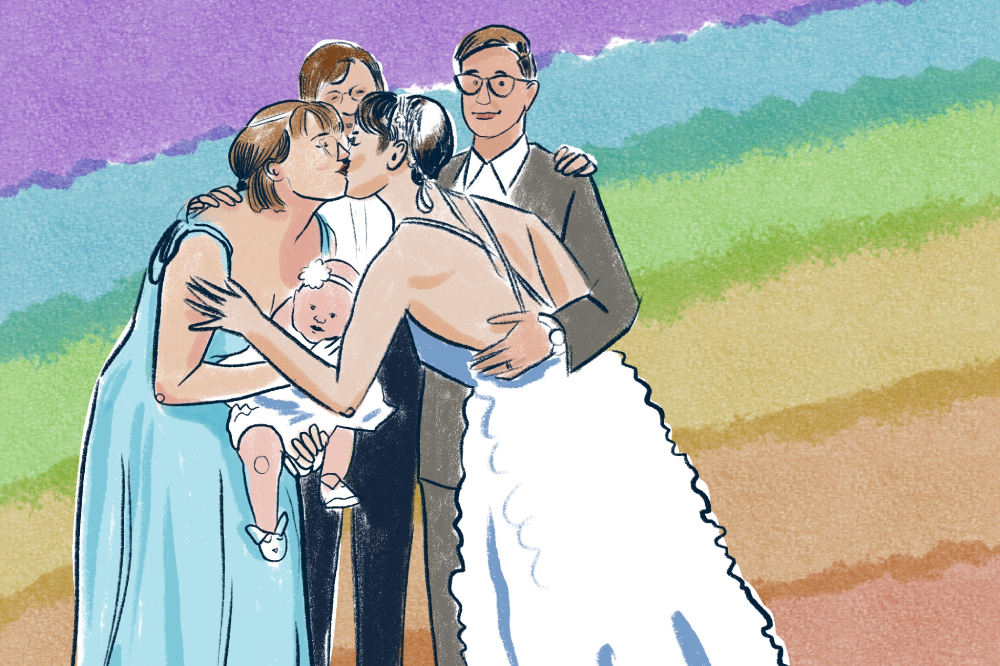Life
 Illustration By Sophie Lucido Johnson.
Illustration By Sophie Lucido Johnson.
I Am Ready to See My Relationship on TV Already
June 30, 2022 @ 9:00am
In March, I attended my girlfriend’s wedding. It was elegant, with many of the elements you’d expect: a flowing white gown, a photo booth with a table of props, “Shout” by the Isley Brothers played at 10 p.m. At first blush, it didn’t necessarily scream “queer wedding.”
But, of course, that’s what it was. My girlfriend Kat married her now-husband in front of friends and family (given and chosen), some of whom they are respectively or collectively also dating. I started dating the bride in 2016, so our relationship was still newer when I got married in New Orleans in 2018, wearing yellow and eating tacos in a public park. Kat and I were each invited to the other’s small ceremonies preceding larger receptions. I kissed her at my wedding, she kissed me at her wedding. Both weddings were occasions to celebrate not only partnership being bound into law, but the community that those partnerships lean on and engender.
I’ve been practicing polyamorous relationships for roughly the last decade. (There was a period at the beginning of this exploration where I would have described myself as “dating around,” before I had cemented what my relationship structure would mean to me and the people I loved.) Let me get this out of the way first: I don’t think polyamorous relationships are for everyone, nor do I think they’re “better.” There are certainly unhealthy polyamorous relationships, just as there are certainly unhealthy monogamous relationships. The relationship structure is not the thing that makes the relationship meaningful, valuable or nurturing.
That said, I have lost count of the number of times I have been watching a TV show or a movie and have said out loud, “This would all just be solved if these people considered polyamory.” It may be an oversimplification to say that all romantic-comedy-style conflicts are rooted in mononormativity, but not by much.
What I don’t see on TV or in movies, meanwhile, are relationships that look like mine. There is a show for polygamist fundamentalist Mormons in Utah. There are a few shows that feature protagonists who are painted as afraid of commitment, and therefore in multiple open relationships. Sometimes throuples crop up on the sidelines of storylines, painted as wacky novelties who might wedge themselves into the main character’s quarter-life-crisis or something. None of these relationships are anything like mine.
I have three partners: my husband Luke, Kat, and my partner Bob, who lives in Atlanta. I have been dating all three of them for longer than five years. These are easily the lowest-drama relationships I’ve ever been in. There are no fiery arguments or hysterical meltdowns. Instead, there are long conversations, a lot of truth-telling and a heaping dose of “I feel” statements.
That sounds like a nightmare to a lot of people, and I get it. Spending hours “processing” is not everyone’s idea of a fun time. But that doesn’t mean it categorically isn’t a fun time! I love to sit and connect with a person I love for hours, trying to figure out what happened, how it made us feel, how it drew upon experiences from our pasts and what it means for our futures. As I write that, I can physically feel a tiny, ironic, sunglasses-wearing voice in my head rolling her eyes. Earnestness is categorically uncool, and to be in polyamorous relationships that really work, earnestness is required.
Here’s the thing: There is no such thing as love without sacrifice. If you are in a monogamous relationship, you sacrifice having sex with anyone else ever again, and if you are in a polyamorous relationship, you sacrifice the emotional comfort that comes with knowing you will always be the winner in someone else’s heart.
It’s precisely this discomfort that is a lot of the draw towards polyamory for me. Jealousy is an interesting emotion. It gives you a roadmap; it tells you about areas of need in your life. One of the “rules” I practice in my relationships is that if there is a person in the relationship who is feeling hurt or jealous or angry, everyone else drops what they’re doing and shows up to hear out and nurture that person. We treat hurt pretty seriously in my polycule (a word describing the group of people who constitute the many connections in a polyamorous relationship configuration), and the result is healing. Sometimes, through all that processing, a person ends up healing from a childhood hurt — something they didn’t even know they were holding on to.
What I really want to make clear is that this relationship structure really works for me. It works for the people in my polycule. This isn’t a phase; this isn’t the horrifying result of commitment-phobic youth wanting to f–k with reckless abandon. I am in my late thirties, and I have a baby. This is still my relationship structure. In fact, having a baby has made all three of my romantic partnerships stronger than ever.
Why isn’t this something that is on TV already? Where is the love story that looks like mine?
Sophie Lucido Johnson is an artist and author of the books “Many Love,” (Simon & Schuster) “Love Without Sex” (Audible) and “Dear Sophie, Love Sophie” (HarperCollins).
Read more of her work at sophielucidojohnson.com and follow
her on Instagram @sophielucidojohnson.







